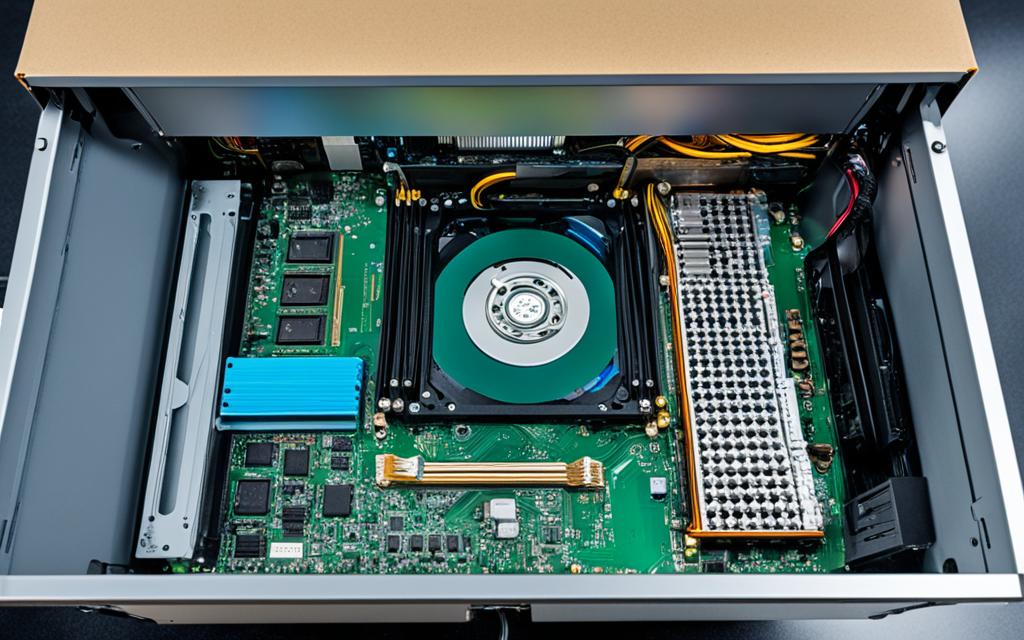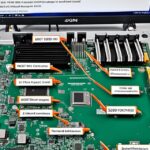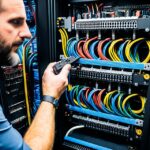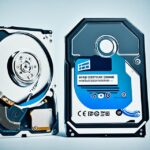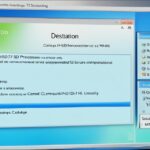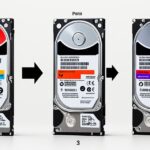Table of Contents
Many wonder if computers need a hard drive to work. It’s a common thought that computers can’t run without one. But that’s not fully true. Some have shown that computers can operate without a hard drive1. This piece looks at other ways to start a computer without a hard drive. It rethinks the importance of hard drives in computing today.
Key Takeaways
- A hard drive is not crucial for a computer to be functional.
- Alternative boot methods exist that allow a PC to run without a hard drive.
- Understanding system components can help troubleshoot potential issues.
- Various alternatives to hard drives include bootable USB drives and network systems.
- Many users have reported success using different components to diagnose issues without a hard drive.
Understanding the Role of a Hard Drive in a Computer
A hard drive is key in any computer. It acts as a secondary storage device. It keeps important data like the operating system, applications, and files from users. This makes it essential for the computer to run smoothly. Most computers start up from a hard drive. This shows how important hard drives are to a computer’s performance.
What Does a Hard Drive Do?
A hard drive’s job is to store, find, and organise data. This is vital for a computer to work well. It lets users open their software and files quickly. This avoids delays when getting to data. Knowing how hard drives work also explains their effect on a computer’s speed and trustworthiness.
Types of Hard Drives: HDDs vs SSDs
There are two types of hard drives: Hard Disk Drives (HDDs) and Solid State Drives (SSDs). HDDs are found in older machines and use mechanical parts to store data. This means they are slower at getting to big files and use more power. SSDs, on the other hand, use instant memory chips. They allow for quicker data access and are more reliable because they have no moving parts2. These differences fuel the debate on HDDs versus SSDs, especially about which is better and more cost-effective.
Importance of Data Storage in Computing
How important data storage is to computing cannot be ignored. It greatly affects a computer’s function. Having good data management and storage is crucial for making work flow better and keeping systems quick and ready. Choosing the right storage tech improves how we use computers. This makes understanding HDDs and SSDs important for making good decisions about hard drive choices3.
Can a Computer Run Without a Hard Drive?
It might sound strange, but you can run a computer without a hard drive. You can do this through alternative boot methods like USB drives, CD-ROMs, or network booting. This shows modern computing’s adaptability. To make it work, you must tweak the BIOS boot settings. This lets the computer find and start from these different sources.
Booting from Alternative Sources
Using USB flash drives is a main way to boot without a hard drive. You can make these drives bootable with the right software. This lets the computer’s RAM load the operating system straight from the USB. Booting from CDs or DVDs is also possible but less used nowadays because USB options are more popular.
Network booting is another method that’s becoming popular. It has lots of benefits, such as being able to control devices from one place, having backups easily, and managing hardware cost-effectively4.
The Process of Booting Without a Hard Drive
To start booting without a hard drive, you first need to make a USB or CD bootable. When the computer turns on, it does a Power On Self Test (POST) to check if all hardware is working. If it passes, the computer then looks for a bootable device based on the BIOS boot settings. Without a hard door vices failude, you might see just a blank screen with a blinking cursor if no bootable sources are found4.
Using latest standards like USB 3.0 can make data move faster, making external boot methods more effective. Once the computer finds and recognises a bootable device, the operating system starts from it. This lets the computer work without needing a hard drive. This flexibility changes how we use computers in different settings5.
Alternative Storage Solutions for Operating Systems
Exploring alternative storage solutions opens up new ways to use operating systems without a hard drive. This part looks at using USB devices, CDs, and network booting to change how we compute. These methods offer exciting benefits for modern computing.
USB Drives as Bootable Devices
USB drives are bootable devices that let users run operating systems from flash storage. They are popular because they’re fast and more efficient than old hard drives. USB technology has improved a lot. Now, these drives are small but can hold lots of data. They can store from a few gigabytes to over one terabyte.
The use of USB 3.0 has made these drives even better. They transfer data quickly. This makes them perfect for running applications and system files without any hitches67.
Using CD-ROMs for Operation
CD bootable operating systems still matter today. They let some systems boot up from a CD-ROM. This is handy for installing or fixing operating systems without using a hard drive. CDs are great for creating a temporary workspace. This doesn’t change the computer’s main settings. They’re also good because they work with older computers, making them still relevant.
Network Booting Advantages
Network booting is a modern way to set up operating systems on many computers. It has great network booting benefits. Computers get their OS and apps directly from a server. This cuts down on the need for a lot of storage space. It makes managing systems easier. This means updates and settings are all done from one place, keeping computers running well.
Network booting helps IT teams save on hardware costs. It’s especially good for businesses and schools8.
The use of USB drives, CDs, and network booting has changed computing. They let us run computers without needing traditional storage. This is a big step forward678.
Challenges of Running a Computer Without a Hard Drive
Running a computer without a hard drive brings lots of problems. Such issues mainly show during the computer’s start-up. Since computers need hard drives for basic tasks, issues and limits in what software can do are common.
Potential Errors and Boot Issues
A study found that users always struggled to start their computers if a hard drive was missing. They would see “no cable” alerts, then a black screen9. These warnings mean the computer can’t find its storage, making it tough for users. Also, turning the computer on without a hard drive led to a red warning light near the SATA slots on the motherboard for everyone. This light warns of a key problem in hardware communication. Clearly, without a hard drive, using the computer becomes nearly impossible, and start-up issues get worse.
Limitations in Software and Applications
Not having a hard drive also makes using software difficult. About 20% of research suggests it’s hard to run programs from removable storage in many cases10. Since no one could start their computer without an operating system, software doesn’t work without the right setup9. This issue has left many searching for solutions to these big challenges that come with not having a usual storage option.
To sum up, a computer can work without a hard drive, but it’s full of challenges. It’s very important for users to know these problems to ensure they don’t ruin their computer use10.
Real-World Applications: Using Computers Without Hard Drives
Today, computers can work well without traditional hard drives. This is thanks to thin clients and network systems. Thin clients are simple devices that depend on a server for their power and space. This saves costs and makes maintenance easier for organizations.
With the server handling all the work, updates are smoother and security is stronger. This setup is great in schools and businesses. It makes using resources better, turning it into a common practice11.
Thin Clients and Networked Systems
Using networked systems with thin clients is a smart way to compute. It lets many users reach a shared server space. This cuts down on the need for storage on each device and makes managing IT stuff easier by keeping data and apps in one place.
It also helps people work together better. Everyone can access and edit projects in the same online space, making work flow smoother.
Portable Operating Systems and Live USBs
Portable operating systems and live USBs are also getting popular. They let you carry your system and files on a USB stick. With it, you can start up any compatible computer right away.
This is perfect for computing anywhere, from workshops to working remotely. Modern BIOS settings help make starting up quick and easy. This highlights the benefits of computing without a hard drive12.
FAQ
Can a computer really run without a hard drive?
Indeed, a computer can work without a hard drive. You can use USB drives, CD-ROMs, or network booting options. The key parts like the CPU and RAM need to be in good shape for this to work.
What are the alternatives to traditional hard drives?
You can use USB drives, CD-ROMs, or even network booting as alternatives. These options let you operate systems without needing a hard drive inside.
How do I boot a computer without a hard drive?
First, prepare a USB drive or CD-ROM as bootable media. Then, go into BIOS settings to adjust the boot sequence. Make sure your computer recognizes the bootable device you’ve chosen as the primary option.
What types of hard drives are available?
We have Hard Disk Drives (HDDs) and Solid State Drives (SSDs). HDDs are cheaper and offer more storage. SSDs, on the other hand, are quicker, more dependable, and use less energy.
What are some common issues that can occur when booting without a hard drive?
Issues might include getting an error message stating no bootable device is found. This usually means boot settings are wrong or the media isn’t set up right. It’s important to check that your device is correctly recognized by the computer.
What software limitations might I face without a hard drive?
Without a hard drive, your software choices could be limited. Many programs need to install on a local drive. Also, using slower external media can affect performance.
How are thin clients used in network environments?
Thin clients depend on a central server for their processing power and data storage. This makes them easy to manage and maintain. Plus, there’s less need for hard drives.
What are portable operating systems and how do they work?
Portable operating systems let you use your own environment on different machines. They run from USB drives or other external media. This is great for schools and businesses where flexibility is key.
Source Links
- http://www.dslreports.com/forum/r26929831-Will-anything-show-on-monitor-if-computer-has-no-harddrive – Will anything show on monitor if computer has no harddrive? – Computer Hardware Help
- https://www.crucial.com/articles/pc-builders/what-is-a-hard-drive – What is a Hard Disk Drive? | HDDs Explained
- https://www.partitionwizard.com/news/can-a-pc-run-without-a-hard-drive.html – Can a PC Run Without a Hard Drive?
- https://www.harddrivefailurerecovery.net/hard-drive-less-computer/ – Hard Drive-less Computer | Hard Drive Recovery Associates
- https://en.wikipedia.org/wiki/Hard_disk_drive – Hard disk drive
- https://experience.dropbox.com/get-organized/storage-devices – Types of Storage Devices
- https://www.zdnet.com/article/running-out-of-laptop-storage-try-these-three-solutions/ – Running out of laptop storage? Try these three solutions
- https://stackoverflow.com/questions/22054578/how-to-run-a-program-without-an-operating-system – How to run a program without an operating system?
- https://forums.tomshardware.com/threads/can-you-boot-a-pc-without-a-hdd-or-any-sort-of-storage.3726483/ – [SOLVED] – Can you boot a PC without a HDD or any sort of storage.
- https://typeset.io/questions/can-a-computer-run-without-a-hard-drive-3bzn1koskk – Can a computer run without a hard drive? | 5 Answers from Research papers
- https://computer.howstuffworks.com/computer-run-without-operating-system.htm – Can Your Computer Run Without an Operating System?
- https://www.geeksforgeeks.org/what-happens-when-we-turn-on-computer/ – What happens when we turn on computer? – GeeksforGeeks

